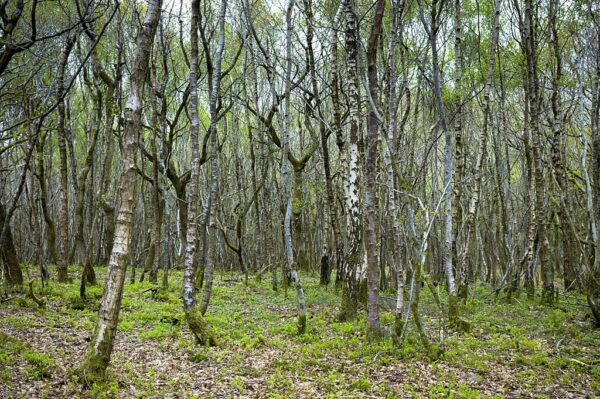Ministers ignored nature advisers on biodiversity targets
Natural England warned ministers that, under current targets, the UK will fail to meet its 30 by 30 commitment

The government ignored recommendations by its statutory nature advisers to boost biodiversity targets, according to documents obtained by Unearthed.
In December last year, the Department for Environment, Food and Rural Affairs (Defra) released a set of targets aimed at protecting and restoring the natural environment. It timed the announcement to coincide with the final days of a global summit on biodiversity in Montreal, Canada, where the UK championed a goal to protect 30% of the planet’s land and seas by 2030 — a target known as “30 by 30”.
Defra’s targets for England include a pledge to create more than 500,000 hectares of wildlife-rich habitat, such as scrubland and native woodland, by 2042 — a goal, it said, that will “help the UK to meet its international commitment to protect 30% of its land and ocean by 2030”.
But six months earlier, Alan Law, the deputy chief executive of Natural England, the government’s nature watchdog, warned that this target would be inadequate.
Responding to Defra’s consultation on the targets, Law argued: “there is a need to be more ambitious to deliver the level of change we need for nature recovery, particularly as there is strong evidence that one of the main reasons species are declining is loss of habitat.”
The additional 500,000 hectares of habitat, he said, was “readily achievable” and equivalent to the habitat delivery rate of the past decade, which has “not stemmed the continuing declines in species abundance”.
He urged the government to increase its wider habitats target by 50% — to at least 750,000 hectares. “We are confident we could achieve this higher ambition,” he concluded.
Even this higher target would leave the UK falling short of its 30 by 30 commitments, Law cautioned. “To meet our international pledge… somewhere in the region of 1.5 million hectares of wider habitat (outside of existing Protected Sites) will need better protection and improved conservation management.”
The letter, obtained using freedom of information rules, also called for the inclusion of a target on protected sites, which it said will “play a vital role” in delivering the 30 by 30 commitment. But Defra did not include such a target, despite Natural England’s warning that failing to do so “could result in perverse or unintended outcomes, which in turn could affect delivery of other targets.”
Labour’s shadow Defra secretary Jim McMahon told Unearthed: “The fact that the government ignored its own statutory advisor when producing its insufficient and delayed Environment Act targets tells you all you need to know about the Tories’ attitude to our environment.
“The Environment Secretary’s targets inflict more toxic air and sewage dumping for longer on the country. It’s clear that the Tory party has given up on governing.”
Mya-Rose Craig, a nature campaigner who goes by the name Birdgirl, told Unearthed: “As one of the most nature-depleted countries on the planet we need the government to radically strengthen its environmental targets in order to deliver on its international commitments and avert the extinction crisis.”
A Defra spokesperson said: “We have full confidence in our Environment Act targets, which were established through intensive consultation with businesses, land managers, environmental organisations, including Natural England.
“The final suite of targets – including our commitment to restore or create more than 500,000 hectares of wildlife-rich habitats by 2042 – are stretching and will require a shared endeavour to be delivered. Through the Environment Act we have ensured a robust legal framework to hold current and future governments to account on these targets, protecting nature for generations to come.”
30 by 30
Britain has been a leading voice on 30 by 30 targets internationally, and was a key member of the ‘high-ambition’ nations going into the Montreal UN biodiversity summit negotiations last December. But multiple reports have warned that the UK is not on track to meet its commitments under the deal it helped deliver.
Last year the British Ecological Society said the UK is set to miss its 30 by 30 goal, while analysis by the group Wildlife and Countryside Link found that just over 3% of England’s land was effectively protected by 2022.
Britain’s leading nature NGOs, fresh from a campaign to halt the Truss government’s ‘attack on nature,’ have backed Natural England’s criticisms.
Craig Bennett, chief executive of The Wildlife Trusts, said: “We need far bigger, much better and more connected wild places to reverse catastrophic declines of wildlife.
“The government has said it ‘cannot be confident’ of delivering a more ambitious strategy for creating space for nature, yet their own advisers say current targets could be increased by at least 50%. That would mean creating or restoring at least 750,000 hectares of wildlife-rich habitat by 2042. Even this is insufficient, but anything less only leads to further declines of wildlife and embarrassment over our failure to meet international environmental commitments.”
“Areas that are already protected include some of the most valuable habitat across England, yet the condition of many of these places continues to decline each year. Worse still, there are no legally-binding targets for improving the condition of protected sites. We must see bolder ambition, more urgent action and a big increase in funding to improve and care for these precious places.”
Nick Bruce-White, the RSPB’s director for England, said: “It is concerning that while [the UK is] saying the right things on the international stage we are not delivering at home, with the Westminster government’s suite of legally binding targets for nature’s recovery failing to include any target for the recovery of our protected sites on land, less than 40% of which are currently in good condition.”

